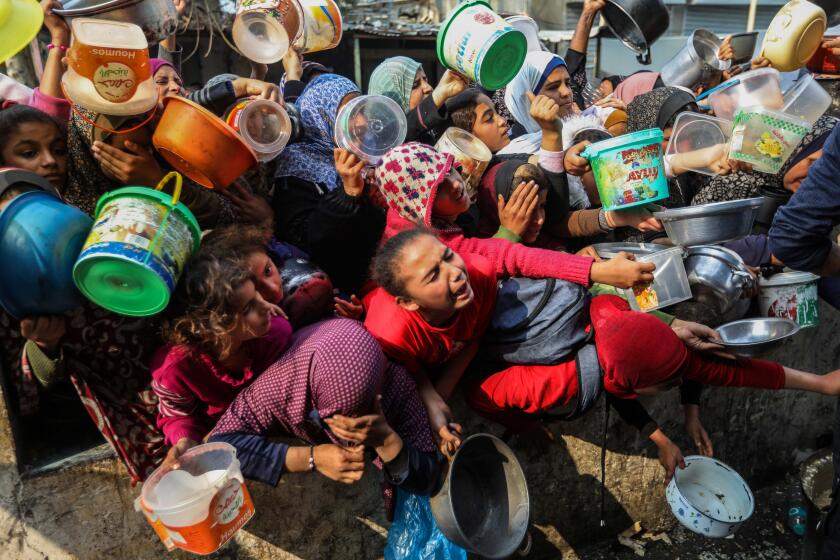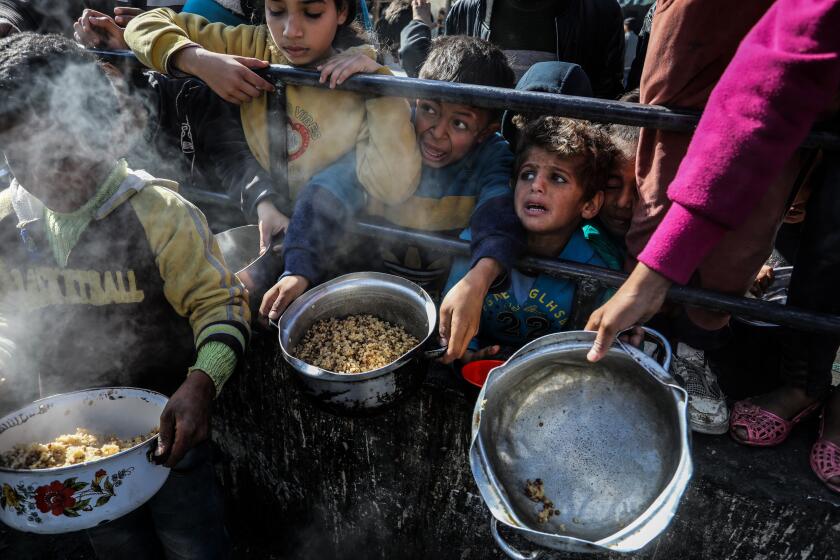Opinion: I’m an American doctor stuck in Gaza. As Israel moves into Rafah, where will physicians and our patients go?

- Share via
As an American doctor, I felt called to help Palestinians who have faced a collapsing healthcare system in Gaza. My first trip was in March and I returned for another mission earlier this month, before the Israeli military assault on Rafah, in southern Gaza, which has been catastrophic. Now we have no way out.
Israel’s seizure of the Rafah border crossing with Egypt has complicated our medical team’s departure from Gaza, which was coordinated with the World Health Organization and scheduled for Monday.
Gaza protests across the U.S. are showing unprecedented support for Palestinians, and demanding accountability like never before.
We have been at the European Hospital in Khan Yunis, near Rafah. If we leave, and no new mission can get in, the patients here will be abandoned and terrified. More than 1 million people had taken refuge in Rafah during the Israeli bombardment of northern Gaza, and hundreds of thousands have now been forced to flee the area amid Israel’s offensive here.
Our patients ask me where they should go, to which hospital. They tell me that some facilities are still open and ask my opinion of them. What do I say? The patients know full well about the destruction of the Al Shifa and Nasser hospitals. They know patients have been killed with IV lines and catheters still inside, and they believe that will be their fate as well if they are left alone and vulnerable to the Israeli forces.
Pausing a shipment of weapons sends a message that the U.S. values human life.
Meanwhile, limited humanitarian aid is getting in. The medical supplies entering Gaza often come in with new volunteers. I brought eight pieces of checked luggage, full of wound-care supplies for this mission. We get patients with wounds over 60% to 80% of their bodies, but we don’t even have absorbent pads to keep their wounds dry, which is necessary to prevent hypothermia.
The Rafah invasion is also worsening the displacement of both the patients’ and the medical staff’s families. Given the hospital’s staffing shortages, families are doing half the work of the nurses. They help turn patients. They help change their diapers. They transfer them to the clinic and back to the ward. They feed them. The patients would be nowhere without their families.
Ramadan is usually a festive holy month for my Muslim family. But as Palestinians living in the U.S., we will be grieving as we fast while Israel’s war in Gaza continues.
If the hospital were abandoned or their families were forced to evacuate, I have no clue how these patients would survive, especially those with amputations restricting their movement. I imagine the patients saying a final goodbye to their loved ones.
Some doctors and nurses have been volunteering here for a long time. Some of us have been to Gaza several times. Yet we continue to be shocked by the cruelty. We are not used to this degree of carnage. Even the local staff continues to be shocked.
As a surgeon, I volunteered at a Gaza hospital. The conditions were unthinkable. With a ground offensive in Rafah, people have nowhere to go.
The local medical staff have avoided telling the patients that our team may have to evacuate before the next set of aid workers can arrive, for fear it would cause a massive panic. Nobody likes talking about evacuation. I can tell they don’t even like to use the word. Even if as doctors, we can’t save people given the limited resources, at least as foreigners, we can provide some protection, standing as a shield against a potential massacre of the patients.
We are still working with the WHO to leave safely, despite the Rafah border closing. Though, it is disturbing that on our planned exit date, a United Nations-marked vehicle was shot at and a foreign aid worker killed.
In the meantime, we will continue to see our patients and provide medical care for as long as we are here. Our organization’s next team is waiting in Cairo, hoping to start their mission.
I remain inspired by the fortitude of the people I’ve met. When some of my patients are under conscious sedation for their dressing changes, their inner selves come out, and many of them call to God. One patient repeated the shahada — the Muslim testimony of faith. Another whose voice I hadn’t heard before raised his hands to the air as he woke, making dua, a prayer of supplication to God.
I hope that the border crossing will reopen and that a new team with more resources will arrive. I hope for a cease-fire to end this man-made humanitarian disaster. For now, as long as I am able to testify to the strength of people in Gaza and share that with the world, I am honored to be among these individuals, who have given me more than I have given them.
Mahmoud Sabha is a wound care physician from La Palma, Calif., residing in Dallas.
More to Read
A cure for the common opinion
Get thought-provoking perspectives with our weekly newsletter.
You may occasionally receive promotional content from the Los Angeles Times.












